英语论文语言学方向选题课件.
- 格式:doc
- 大小:43.51 KB
- 文档页数:8
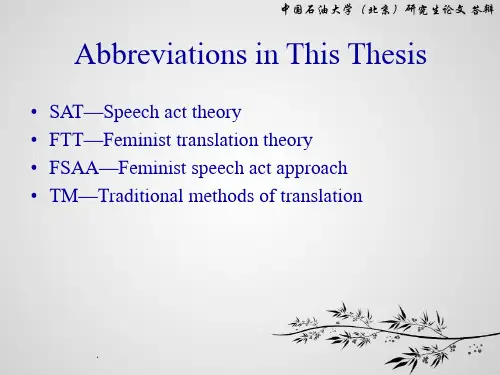

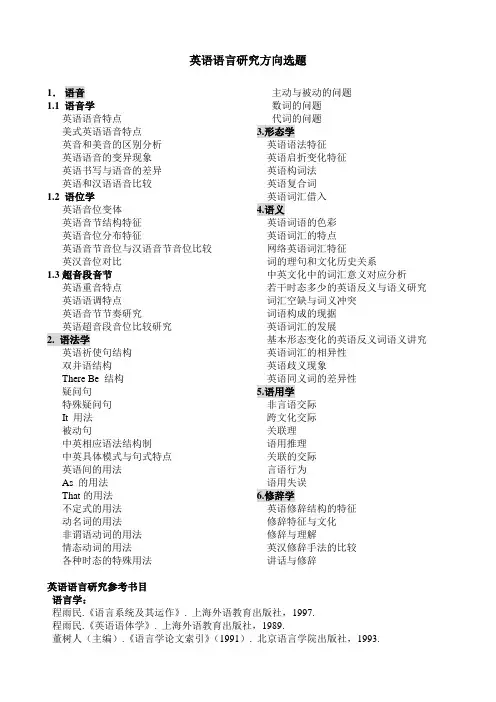
英语语言研究方向选题1.语音1.1 语音学英语语音特点美式英语语音特点英音和美音的区别分析英语语音的变异现象英语书写与语音的差异英语和汉语语音比较1.2 语位学英语音位变体英语音节结构特征英语音位分布特征英语音节音位与汉语音节音位比较英汉音位对比1.3超音段音节英语重音特点英语语调特点英语音节节奏研究英语超音段音位比较研究2. 语法学英语祈使句结构双并语结构There Be 结构疑问句特殊疑问句It 用法被动句中英相应语法结构制中英具体模式与句式特点英语间的用法As 的用法That的用法不定式的用法动名词的用法非谓语动词的用法情态动词的用法各种时态的特殊用法主动与被动的问题数词的问题代词的问题3.形态学英语语法特征英语启折变化特征英语构词法英语复合词英语词汇借入4.语义英语词语的色彩英语词汇的特点网络英语词汇特征词的理句和文化历史关系中英文化中的词汇意义对应分析若干时态多少的英语反义与语义研究词汇空缺与词义冲突词语构成的现据英语词汇的发展基本形态变化的英语反义词语义讲究英语词汇的相异性英语歧义现象英语同义词的差异性5.语用学非言语交际跨文化交际关联理语用推理关联的交际言语行为语用失误6.修辞学英语修辞结构的特征修辞特征与文化修辞与理解英汉修辞手法的比较讲话与修辞英语语言研究参考书目语言学:程雨民.《语言系统及其运作》. 上海外语教育出版社,1997.程雨民.《英语语体学》. 上海外语教育出版社,1989.董树人(主编).《语言学论文索引》(1991). 北京语言学院出版社,1993.董树人(主编). 《语言学论文索引》(1992). 北京语言学院出版社,1994.董树人(主编). 《语言学论文索引》(1993). 北京语言学院出版社,1995.董树人(主编).《语言学论文索引》(1994).北京语言学院出版社,1996.董树人(主编).《语言学论文索引》.北京语言学院出版社,1997.桂诗春.《应用语言学》.湖南教育出版社,1988.桂诗春.《心理语言学》.上海外语教育出版社,1985.桂诗春,宁春岩主编.《语言学方法论》.外语教育与研究出版社,1997.何自然.《语用学概论》. 湖南教育出版社,1988.刘辰诞.《教育篇章语言学》.上海外语教育出版社,1999.刘润清.《西方语言学流派》.外语教育与研究出版社,1995.戚雨村.《语言学引论》.上海外语教育出版社,1985.戚雨村.《现代语言学的特点和发展趋势》.上海外语教育出版社,1997.秦秀白.《文体学概论》,湖南教育出版社,1986.赵世开.《美国语言学简史》.上海外语教育出版社,1989.王德春.《语言学概论》.上海外语教育出版社,1997.王宗炎.《语言学和语言的运用》.上海外语教育出版社,1998.王宗炎.《语言问题探索》.上海外语教育出版社,1985.伍谦光.《语义学导论》.湖南教育出版社,1988.杨自俭,李瑞华.《英汉对比研究论文集》.上海外语教育出版社,1990.祝畹琼.《社会语言学概论》.湖南教育出版社,1992.伍铁平.《模糊语言学》.上海外语教育出版社,1999.中国英汉语比较研究会《英汉语比较研究》.湖南科技教育出版社,1994.Carroll,D.W.Psychology of language,3rd edition(语言心理学),外语教育与研究出版社,2000. Fasold,R.The Sociolinguistics of Language(社会语言学),外语教育与研究出版社,2000. Gee,J.P.An introduction to Discourse Analysis:Theory and Method(话语分析入门:理论和方法),外语教育与研究出版社,2000.Hudson,R.A.Sociolinguistics(社会语言学),外语教育与研究出版社,2000.J.Kramsky.”Papers in General Linguistics”,Paris:Mouton the Hague,1976.Lyons,J.Linguistic Semantics:An Introduction(语义学引论), 外语教育与研究出版社,2000. Peccei,J.S.Pragmatics(语用学), 外语教育与研究出版社,2000。

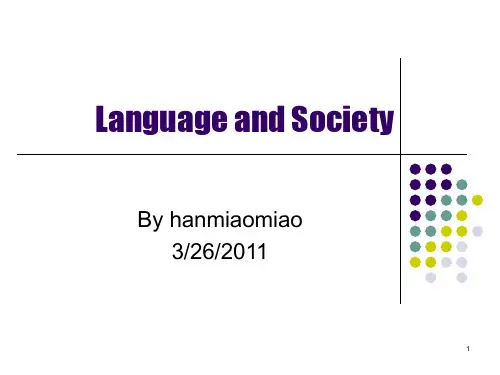

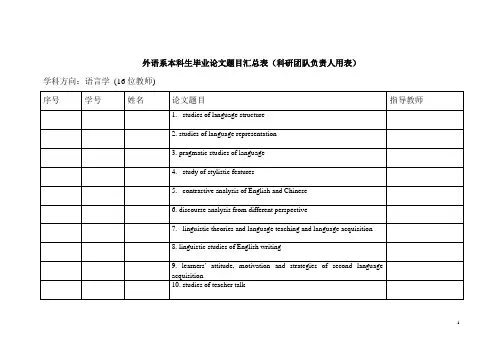
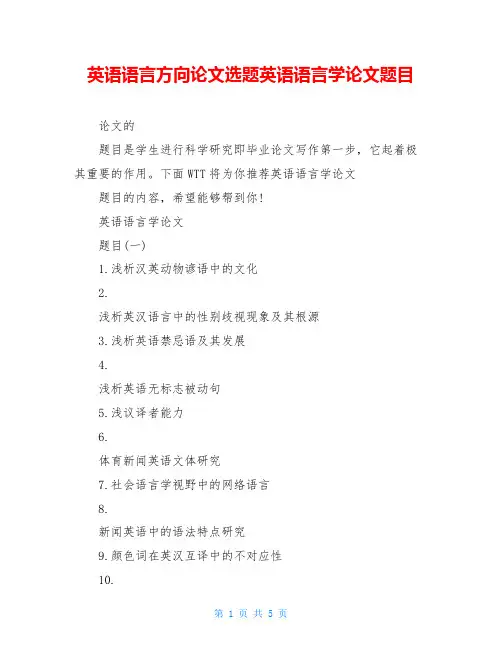
英语语言方向论文选题英语语言学论文题目论文的题目是学生进行科学研究即毕业论文写作第一步,它起着极其重要的作用。
下面WTT将为你推荐英语语言学论文题目的内容,希望能够帮到你!英语语言学论文题目(一)1.浅析汉英动物谚语中的文化2.浅析英汉语言中的性别歧视现象及其根源3.浅析英语禁忌语及其发展4.浅析英语无标志被动句5.浅议译者能力6.体育新闻英语文体研究7.社会语言学视野中的网络语言8.新闻英语中的语法特点研究9.颜色词在英汉互译中的不对应性10.移就的审美价值和生成基础11.以认知为基础的颜色隐喻研究12.隐喻认知功能研究的新视角13.隐喻与一词多义的关系14.英汉被动句对比研究15.英汉宾语类型差异的认知原因16.英汉动词非谓语用法之比较研究17.英汉否定问句的答句对比研究18.英汉汉英双关语及其翻译研究19.英汉合成词构词对比研究英语语言学论文题目(二) 1.副词EVER的句法环境和语义特征2.功能语法视角下的英语报纸新闻标题的功能3.广告口号语的语言特点4.国际商务文化之对比研究5.汉语中双关语的翻译6.基于概念隐喻的诗歌解读7.论广告英语中的幽默8.论广告英语的语言特点9.论汉英谚语的语言特征10.论清教理念与美国西进运动11.论莎士比亚十四行诗中的时间12.论英语广告中几种常用修辞格及其汉译13.论尤金?奥尼尔的表现主义手法14.名词化的语篇功能15.诺曼时期法语对英语词汇的影响16.浅谈英语虚拟语气的语用功能17.浅谈英语虚拟语气及其语用功能18.浅析二十世纪计算机英语词汇的构成特点英语语言学论文题目(三)1.浅谈英汉句子结构差异2.诗意的美和喜剧性幽默3.试论广告英语的语言特点4.统觉团对英语初学者词汇学习的影响5.外语学习中应该重视中介语的作用6.新闻报道中的转述动词研究7.英汉禁忌语、委婉语的对比研究8.英汉数字习语的对比研究9.英译汉中词序的变动10.英语广告的语言特征11.英语双关语汉译的可译性限度12.词义演变的原因与方式13.从汉语中英语借词的翻译看文化交流14.从价值观转换看斯佳丽的角色特征15.从礼貌准则看中英文化的异同16.从习语看英汉民族的文化差异17.从英语人名中看性别歧视18.动词过程类型的选择和话语隐性态度的表达19.对母语在英语写作中词汇负迁移现象的思考20.对严复译作中“信”的质疑21.法律英语用词特征分析22.法律语言翻译与法律文体。
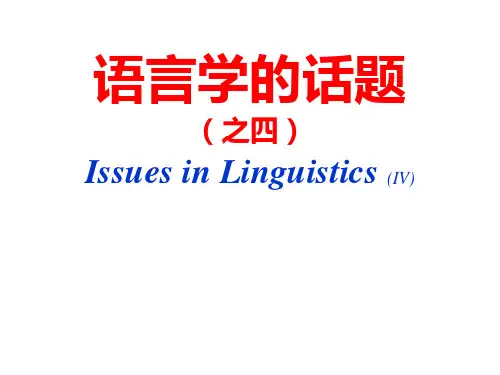
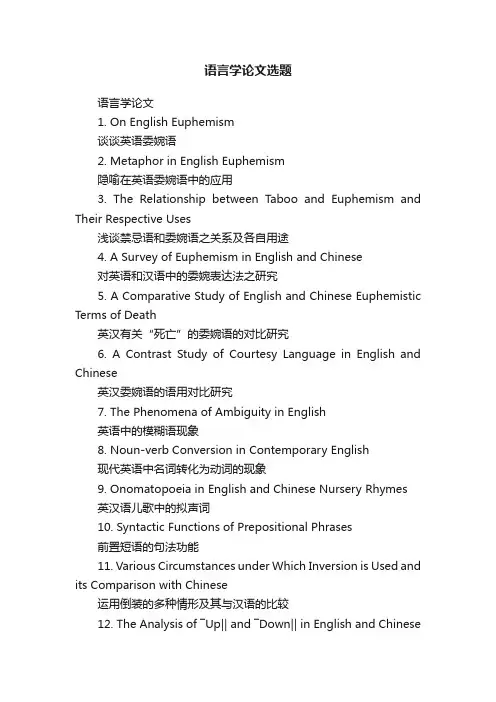
语言学论文选题语言学论文1. On English Euphemism谈谈英语委婉语2. Metaphor in English Euphemism隐喻在英语委婉语中的应用3. The Relationship between Taboo and Euphemism and Their Respective Uses浅谈禁忌语和委婉语之关系及各自用途4. A Survey of Euphemism in English and Chinese对英语和汉语中的委婉表达法之研究5. A Comparative Study of English and Chinese Euphemistic Terms of Death英汉有关“死亡”的委婉语的对比研究6. A Contrast Study of Courtesy Language in English and Chinese英汉委婉语的语用对比研究7. The Phenomena of Ambiguity in English英语中的模糊语现象8. Noun-verb Conversion in Contemporary English现代英语中名词转化为动词的现象9. Onomatopoeia in English and Chinese Nursery Rhymes英汉语儿歌中的拟声词10. Syntactic Functions of Prepositional Phrases前置短语的句法功能11. Various Circumstances under Which Inversion is Used and its Comparison with Chinese运用倒装的多种情形及其与汉语的比较12. The Analysis of ―Up‖ and ―Down‖ in English and Chinese分析Up和Down在英语和汉语中的用法13. The Comparison between English and Chinese Conjunctions英汉连词对比14. Difference between Attributive in Chinese and English and How to Translate English Attributive Clauses英汉定语比较与定语从句翻译15. A Tentative Study of Post-posed Adjectives后置形容词初探16. On Simplification of English Sentences谈英语句子的简化17. Lexical Items as Means of Cohesion in English Texts英语语篇中的词汇衔接手段18. On English Idioms in Text论语篇中的英语习语19. On Personal Pronouns in English from the Textual Perspective语篇角度的英语人称代词分析20. Cultural Characteristics of English Words英语词汇的文化特征21. Latin‘s Influence on the English V ocabulary in the History Perspective 拉丁语对英语词汇的影响22. The Feature of English V ocabulary on the Internet网络英语词汇特点23. Differences Between American English and British English on Lexis 英式英语和美式英语词汇的差异24. Context of Culture and Connotative Meaning of Words文化语境与词汇内涵意义25. The Polite Language in the English Language英语中的礼貌用语26. On the Relations of Basic Language Skills基本语言技能的关系27. The Research on Collocation based on Corpora Linguistics基于语料库的词语搭配研究28. The Research on Semantics in Cognitive Linguistics认知语言学框架中的语义研究29. Language Determinism vs Language Relativity语言决定论还是语言相对论30. The Role of Meta-cognitive Strategy in Second Language Acquisition 第二语言习得中元认知策略的作用31. The Comparison of TG Grammar and Systemic-Functional Grammar 转换生成语法与系统功能语法比较面面观32. The Rules of Turn-taking in Conversations会话中话轮转换的规律33. Conceptual Nature and Pragmatic Value of Metonymy借代的概念本质和语用价值34. On the Use of Direct and Indirect Speech论直接引语和间接引语的运用35. On the Functions and Maxims in the Cooperative Principle论合作原则的功能与准则36. A Comparative Study of Transferred Epithet in English and Chinese英、汉语移就的比较研究37. Influences of Chinese Dialectic Accents over English Pronunciation汉语方言对英语发音的影响38. Cultural Difference between China and the West and English Pragmatics Errors中西文化差异与英语语用失误39. The Cultural Differences between China and the U.S.A. in Everyday Communication中美日常交际中的文化差异40. The Contrastive Study on the English and Chinese Expressions in Refusing or Declining 英汉拒绝语的对比研究41. Study on the American Slang---From the Cultural and Linguistic Perspective从文化和语言学的视角看美国俚语42. On the Structural and Semantic Features of English Idioms浅谈英语习语的结构和语义特征43. Similarities and Dissimilarities of British and American English英式英语和美式英语的异同44. A Comparative Analysis of Pronunciation in British and American English英式英语与美式英语发音比较45. Causes and Expressions of Sexism in English论英语性别歧视的表现与成因46. How to Understand Headlines of English Newspaper如何理解报刊英语中的标题47. The Characteristic of Tense Forms of English Newspaper Headlines报刊英语标题的时态特点48. How the New Words Are Created in English Newspaper报刊英语中的新词是如何产生的49. The Characteristic of Words Used in Newspaper Headlines报刊英语标题的用字特点50. News Headlines: Their Features and Style英语新闻标题的特色与文体风格51. The Feature of the V ocabulary in English Advertisements广告英语的词汇特点52. On Rhetorical Skills in English Advertisements浅议英语广告中的修辞艺术53. An Analysis of the Features of Advertising English广告英语的特征分析54. Lexical Items as Means of Cohesion in Chinese and English Advertisements of Cosmetics英汉语化妆品广告中的词汇衔接55. The Style Characteristics of Advertising English广告英语的文体特点56. Rhetorical Devices in Advertising English广告英语的修辞手法57. Figures of Speech in English & Chinese Advertisements中西广告语中的修辞现象分析运用58. On Coherence in News English论新闻英语中的连贯问题59. Linguistic Features of English Business Contracts商务合同的语言特征60. A Linguistic Point of View on Design of Foreign Language Multi-media Courseware外语多媒体课件设计的语言学思考62.The Communicative Value of Intonation in Spoken Discourse英语语调在口头语篇中的意义63.On the Politeness and Cooperation Used in the Language Learning语言学习中的礼貌和合作原则64.The Significance of Repetition in Text Coherence重复在语篇连贯中的作用65.The Research on the Relations between Motivations, Methods, and Attitudes of English Learning for College Students 大学生英语学习动机、方法、态度关系研究66.Personality Factors to the Success of Foreign Language Learning个性因素在外语学习中的作用67.The Analysis of Common Features for Successful English Learners成功英语学习者特征分析68.Self-monitoring in Second Language Acquisition第二语言习得中的自我监控69.The Role of Memory in Second Language Acquisition记忆在第二语言习得中的作用美国黑人英语和政治背景措词与语境从中式英语的现状看其发展趋势中式英语之争:希望与现实中国英语与国际交流从英语发展史来分析汉语热的趋势如何使中式英语成为标准英语?论中式英语成为英语主要方言之一的巨大潜力政治委婉语在伊拉克战争中的使用浅谈英语委婉语的社会心理基础及其语用语义特征英语委婉语构成及其社会功能歧义的语用研究以及对英语学习的启示英语句子歧义初探模糊词在人际交往中的应用英语语言中的性别和种族歧视现象男女英语言语习惯的差异英语广告中的双关语的分类及其修辞作用网络英语新词的形成及其特点词汇发展中的特殊现象——非术语化被动语态在商务英语中的语用作用从礼貌的视角看性别的语言行为差异中西方文化差异的论文题目:中西方时间观念的比较中西方饮食文化的比较中西方教育的比较中西方问候语的比较中西方餐桌礼仪的差异中西方宗教文化对比中西方儿童文学的差异从文字比较看中西方文化差异礼貌中的中西方―面子文化‖差异论中西方激励机制的差异比较和在医疗管理中的应用英语教学中的文化教学——中西方文化差异对比分析中西方价值观差异对交际模式的影响从历史中透视中西方经济差异形成的原因浅谈跨越中西方文化障碍日常生活中的中西方文化差异浅析中西方隐私观的差异中西方古代体育和谐思想比较研究中西方传统犯罪控制思想之比较土地与海洋的对话——中西方文化与人格差异之浅见汉英商标翻译与中西方文化差异中西方孝文化探析从文化视角看中西方教育思想的差异中西方语言与文化的差异中西方哲学语言观的差异浅析中西方文化差异对翻译的影响从素质教育看中西方教育的差异及思考中西方立宪文化差异比较——以价值观为视角影响跨文化交际的主要因素——中西方价值观念差异中西方股票期权制度实际操作的差异性分析英语词汇学论文论文题目英语语言的特征试论英语逆序构词法论英语主谓一致The Change of English word Meaning:Factors and Types英语词汇意义变化的影响因素与类型运用―发散思维‖来扩大学生的词汇量现代英语词汇迅速发展的源泉网络英语的词汇类型及其特点广告英语的词汇特点英语教学中词汇的处理英语词汇意义的特点与词汇教学论中英文中动物词汇的文化差异英汉文化内涵在动物词汇上的体现试论篇章词汇衔接的语义基础英汉词汇文化内涵探析女性相关词汇及其文化内涵动物词汇的应用及其隐喻性的探索就词汇空缺谈旅游英语翻译技巧汉英语姓名文化对比研究英语颜色词的词义及文化对比研究论提高大学英语词汇教学浅析词汇的记忆与词的形态理据之问的关系试析英语中的歧义现象大学英语词汇教学的有效方法2095 英语词汇教学新探英语词汇的联想与搭配探析英汉词汇比较中文化内涵的展现英汉词汇的文化差异隐喻对英语词汇演变的影响隐喻认知理论对英语词汇教学的启示论英语词汇搭配的特征言语听辨中的词汇提取英语词汇的认知与活用文学论文题目1. American Slang in Catcher in the Rye《麦田的守望者》中的美国俚语2. Different Marriages in Pride and Prejudice解析《傲慢与偏见》中的不同婚姻3. Different Attitudes towards Love and Marriage---An Analysis of the Four Different Characters in Pride and Prejudice 试分析《傲慢与偏见》中四姐妹对爱与婚姻的不同态度4. Ice and Fire---An Analysis of the Characters in Jane Eyre若冰若火---试析《简·爱》中的几个人物5. Wuthering Heights---The Song of Rebel《呼啸山庄》---反叛之歌6. Black American‘s Culture and Attitudes Towards Life---The Analysis on Everyday Use美国黑人文化和生活价值取向---《外婆的日用家当》赏析7. The Repeated Themes in Singer‘s Novel s---The Analysis on Gimpel the Fool从Gimpel the Fool试析辛格小说中永恒的主题8. A Study of the Themes of the Poems by Emily Dickinson论爱米丽·狄更森诗歌的主题思想9. Naturalism in Sister Carrie by Theodora Dreiser简析《嘉丽妹妹》中的自然主义创作特点10. An Analysis of the Character ---- Carrie Meeber嘉丽·米伯人物性格分析11. Feminism in the Novel Purple论小说《紫色》中反映的女性主义意识12. Hemingway and His Writings海明威和他的创作13. An Analysis of Writing Style by Earnest Hemingway海明威的文体分析14. The Conflict of Nature and Society in The Adventures of Huckleberry Finn自然与社会的冲突--- 论《哈克贝里·费恩历险记》15. On the International Themes of the Writing by Henry James论亨利·詹姆斯创作中的国际主题16. The Spokesman for the Oppressed ---- Comment on John Steinbeck‘ The Wrath of Grapes 受压迫者的代言人——约翰·斯坦贝克和他的《愤怒的葡萄》17. Reason and Passion---- A study of the Novel Wuthering Heights理智与情感--- 简析小说《呼啸山庄》18. On T.S. Eliot‘s Mythological Consciousness论T.S.艾略特的神话意识19. A Comparison Between the Themes of Pilgrimage to the West and Pilgrim‘s Progress 《西游记》与《天路历程》主题之比较20. A Probe into the Philosophical Idea in Robe rt Frost‘s Poetry弗罗斯特诗歌中的哲学思想的探索21. On the Linguistic Features of Hemingway‘s Old Man and the Sea论海明威《老人与海》的语言特点22. Metaphoric Expression in Poem ―…..‖论《…》诗歌中的暗喻23. On the Irony and Black Humor in Catch-22论《第二十二条军规》中的讽刺与黑色幽默24. American Dream or American Tragedy: An Analysis of Myth in The Great Gatsby美国梦或美国悲剧:《了不起的盖茨比》中的神话分析25. On the Religious theme in A Good Man Is Hard to Find论《好人难觅》中的宗教主题26. On the Narrative Techniques in William Faulkner‘s As I Lay Dying论威廉姆·福克纳《我弥留之际》中的叙事技巧27. The Narrative Literary Features of the Bible《圣经》记叙文学的特点28. The Literary Features of the Psalms《圣经》诗篇的文学特点29. The Language and the Concept of the Bible《圣经》的语言和思想30. A Comparative Study of the Bible Hero Samson and Greek mythological Hero Achilles 《圣经》参孙英雄和希腊神话阿喀琉斯英雄的比较研究31. The Bible and Western Festivals《圣经》与西方节日32. The Attraction of Harry Potter And The Sorcerer‘s Stone《哈利·波特与魔法石》的魅力33. A Comparison of Allan Poe and XX试比较爱伦·坡与XX34. On Edgar Allan Poe‘s Poetic Theory Manifested in The Raven论爱伦·坡的诗论在《乌鸦》中的体现35. The Theme of Death --- Research on Allen Poe‘s Works死亡主题—爱伦坡作品研究36. Multi-symbolic Quality in Hawt horne‘s Scarlet Letter论霍桑的《红字》的多重象征性37. Theme and Form in Doris Lessing's The Golden Notebook莱辛的《金色笔记》中的主题与形式分析38. On the Feminism in Doris Lessing's Works莱辛作品中的的女性主义39. On the Post-modernistic American Jewish Writer Grace Paley美国后现代犹太女作家格蕾斯·佩蕾40. A Summary on Development of American Feminist Literary Criticism 美国20世纪黑人女权主义文学批评发展概述41. On the Image of Satan in Paradise Lost试论《失乐园》中撒旦的形象42. The Economic Influence on Marriage in Pride and Prejudice《傲慢与偏见》中经济对婚姻的影响43. San tiago: A typical Hemingway‘s Hero桑提亚哥——海明威笔下的硬汉44. Symbolism in The Great Gatsby《了不起的盖茨比》中的象征45. On the Female Characters in D. H. Laurence‘s Fiction劳伦斯笔下的女性形象46. The Tragic Color of Ernest Hemingway's Novels欧内斯特·海明威小说中的悲剧色彩47. On the Humanism in Ernest Hemingway's War Stories欧内斯特·海明威战争小说中的人道主义分析英美社会与文化论文1. The Contrast and Analyses of Customs in Britain and China英国和中国习俗之研究2. Cultural Connotation of English Names英语姓名的文化内涵3. Black Culture and American English黑人文化与美国英语4. The Phenomenon of ―Political Correctness‖ in American English论美国英语中的政治正确现象5. English Euphemism and Culture文化因素与委婉语6. Cultural Differences in Address Terms: English and Chinese英汉称呼语中的文化差异7.Influence of Greek Myths to British and American Culture 希腊神话与英美文化8. An Investigation on Intercultural Communication Competence and Intercultural Sensitivity Among Chinese College Students关于中国大学生跨文化交际能力和跨文化敏感度的调查9. Cross-Cultural Awareness in Translating Tourist Materials中国旅游资料翻译中的跨文化意识10. Cross-Cultural Training in Chinese Universities中国大学中的跨文化培训11. Acculturation Strategies among Chinese Overseas Students中国海外留学生的文化适应策略12. On Tour Commentary Translation---An Intercultural Communication Perspective从跨文化角度看导游词翻译13. Intercultural Communication on the Internet互联网上的跨文化交际14. On the Application of Theatrical Tricks to the Shakespeare‘s Dramas论莎士比亚戏剧中的舞台技巧的应用15. The Bible and Western Festivals《圣经》与西方节日16. On Culture-loaded Animal Words in Cross-Cultural Communication跨文化交际中的动物文化词研究17. The Cultural Differences Between Chinese and English from the Cultural Attached Meaning of Animal Words 从动物词汇看汉英文化的差异18. On Plants Words and Culture论植物词汇与文化19. On the Cultural Connotations of Color Words in English and Chinese中英颜色词文化内涵研究20. Cross-cultural Communication on the Translation of the Chinese ―Long‖从中国―龙‖字的翻译看跨文化交际21. On English and the Chinese Borrowing Words and the Cultural Differences论中英借用词与文化差异22. A Contrast of the Symbols of American and Chinese Culture中美文化象征比较研究23. The Contrastive Study on the Courteous Expressions in English and Chinese英汉礼貌用语对比研究24. Body Language in Non-verbal Communication浅谈非语言交际中的身势语25. Culture Consciousness in the English Language Teaching英语教学中的文化意识26. Reinforcing Equality in Cultural Communication in Cross-cultural Communication跨文化交际应加强文化平等交流意识27. Cross-cultural Difference on the Non-verbal Communication非言语交际的跨文化差异28. Improper Cultural Transferences in Cross-Cultural Communication文化负迁移对跨文化交际的影响29. On Cross-Cultural Communication Phenomenon论跨文化交际现象30. The Difference of Cultural Thinking Between English and Chinese and the Intercultural Communication英汉文化思维差异与跨文化交流31. Chief Factors Affecting Cross-Cultural Communication--- Difference Between Chinese and Western Values影响跨文化交际的主要因素---中西方价值观念差异32. Taboos in Cross-Cultural Communication--- Probing into the Difference Between Western and Chinese Culture 跨文化交际中的禁忌问题---中西方文化差异之探讨33. Cultural Differences in Cross-Cultural Communication Between Chinese and English Language 谈英汉跨文化交际中的文化差异34. The Difference of the Eastern and Western Mode of Thinking and Cross-Cultural Communication 中西思维模式差异与跨文化差异35. Cross-Cultural Communication in Interpretation口译中的跨文化交流36. The Cultural Perception and Memory in Intercultural Communication跨文化交流中的文化感知和文化记忆37.Cultural Factors of English Catchwords英语流行语的文化因素38.The Epitome of Contemporary American History and Culture--- Interpreting Forrest Gump 当代美国历史和文化的缩影---解读《阿甘正传》39. Body Language in Non-verbal Communication浅谈非语言交际中的身势语40. Differences and Resources of Addressing in English英汉语中称谓的差异及其成因41. Cultural Interpretations of English and Chinese Names英汉姓名的文化阐释42. Different Body Languages in Different Cultures身势语在不同文化下的差异43. Functions of Non-verbal Behavior in Intercultural Communication非言语行为在跨文化交际中的功能44. The Contrastive Study on the Courteous Expressions in English and Chinese英汉礼貌用语对比研究45. The Presentation of Different Thinking Modes in Chinese and Western Religious Cultures 中西方宗教文化中的不同思维模式46. The Breath of American Slang美国俚语初探47. The Influences of Western Festivals on Chinese Society西方节日对中国社会的影响48. Cultural Migration of Western Festivals西方节日的文化入侵49. The Influence of Borrowing Words on English and Chinese V ocabulary英汉词语互借对语言文化的影响50.Cross-Cultural Communication in Business World商务领域跨文化现象51.Christianity and American Culture基督教与美国文化52. The Studies of Chinese Movies and Culture中国电影与文化53. Cultural Implication of Chinese Cuisine中国饮食文化的内涵54. Diversities of Chinese and Western Culture from the Sources of English and Chinese Idioms从汉英习语来源看中西方文化的差异55. The Social Status of the Blacks in America after the Civil War美国内战后的黑人社会地位56. A Comparison of Garments Culture between the East and the West中西服饰文化对比57. A Research on Cross-Cultural Difficulties in Reading Comprehension影响阅读理解的跨文化因素研究58. The Reasons of Ancient Greek Mythology Influencing the English Language古希腊神话故事对英语语言影响的原因59. A Cultural Perspective on Chinese and WesternTrademarks中西方商标的文化视角60.English Idioms and the Western Culture英语习语和西方文化61. A Tentative Study on English and Chinese Euphemism汉英委婉语研究62.American Place Names and Their Culture美国地名和文化63.A Comparison of Courtesy Conventions between Chinese and English汉英礼貌用语的异同64.Animal Words in Chinese and English Idioms and Their Translations中英习语动物词异同及其翻译65. Cultural Differences on Etiquette between China and Western Countries中西方礼仪文化差异66.Increasing Cultural Awareness of Secondary School Students如何提升中学生的文化意识67.A Comparative Study of Compliments: Cross-Culture Perspectives从跨文化的角度对比中西方问候语的差异翻译论文1. Translation of Culture and Facsimile of Culture文化翻译与文化―传真‖2. Pragmatics and Advertisements translation, with Special Emphasis on E/C Cultural Difference 语用学与广告翻译3. On Augmentation of Translating English into Chinese谈英译汉翻译中的增词法4. Translation of Onomatopoeia in English Poetry英语诗歌中拟声词的翻译5. A Brief Study on Translation of Advertising Language广告语言翻译特点与技巧6. Literal Translation vs Free Translation分析比较直译和意译7. Research on the Comparison of Commercial Translation and Literary Translation外贸翻译和文学翻译的比较研究8. Comparative Analysis of the Translation of Film Titles in Mainland and Hong Kong内地和香港电影片名翻译的比较分析9. Intention and Translation of Personages‘ Names in Dream of Red Chamber论《红楼梦》中人物名的文化内涵与翻译10. On Cohesion in Translation of Chinese Works中文文学作品英译的衔接手段11. On Translation Strategies in Advertising English论广告英语翻译技巧12. Translation Principles of Neologism in Political English政务英语新词翻译13. Influences of Cultural Differences on Euphemism and Its Translation文化差异对中英文委婉语翻译的影响14. On The Usage of Foreignization and Domestication in Chinese Poetry Translation中国古诗词翻译中的归化和异化15. Introduction and Approaches on Translation of Chinese Cuisine中国饮食文化与菜名翻译70.Ways to Avoid Errors in Tourism English Translation避免旅游英语翻译误区的方法17. Metaphor and Simile in Chinese-English Translation汉英翻译中暗喻和明喻的处理18. Translation of Titles on Newspaper and Magazines 报纸杂志标题的翻译19. On the Inversion Used in the Translation of Negative and Positive Form in New English Course 《新编英语教程》中句子肯定和否定形式翻译中转换20. Strategies of Interpretation in News English 新闻英语口译技巧21. Negative Transfer of Mother tongue to Translation 母语负迁移对翻译的影响22. A Tentative Study on Translating Methods in Legal English法律英语翻译方法研究性学习23. Cultural Influence in Advertising English and Translation广告英语中文化差异和翻译24. The Role of Context in Translation 语境在翻译中的作用25. Acronyms and Initials in International Trade English and Their Translations国际商务英语中的缩略语及其翻译26. Oxymoron and its Translation Methods 英语矛盾修饰法与翻译27. A Brief Analysis on Translation of Address Forms in Dream of the Red Chamber浅析《红楼梦》中的称谓翻译28. On Translation of English Book Title into Chinese 谈英语书名的汉译29. A Brief Comment on the Several Chinese Version of Jane Eyre简评《简·爱》的几种汉译本30. Translating the Style of Literary Works ----- A Preliminary Study of Wu Ningkun‘s Version of The Great Gatsby 文学作品的风格翻译――评巫宁坤的《了不起的盖茨比》译本31. Tentative Discussion on Translation of Names of Films and TV Serials浅谈电影片名及电视剧名的翻译技巧32. The Idiom Translation and the Image Connotation in English and Chinese成语翻译中文化意象的传递与转换33. The Analysis and Translation of Number Seven and Eight in Two Cultural Backgrounds数字―七‖与―八‖的东西文化对比分析与翻译浅谈34. The Analysis and Translation of Names of Streets or Roads and Public Notice浅析街道名称及公式语翻译35. The English Grammar Influence in Chinese Translation of Passive V oice Sentences被动语态句子翻译中的西化现象36.Derivation and Translation of English Phrasal Literary Quotations英语典故性成语的来源与汉译37.On the Use and Translation of ―as…as…‖论as…as…的用法与翻译38.On the Chinglish in C-E Translation浅析汉英翻译种的中式英语39.A Study on Cultural Conflicts in E-C Translation试论英汉翻译中的文化冲突40.On Rhetorical Methods in E-C Translation英汉翻译中修辞手段初探41.On the Cross-culture Awareness in Translation跨文化意识与翻译42.Generalization, Concretization and Adaptation in C-E Translation试论汉译英中的虚实转换与变通43.Reiteration and its Application in Chinese-English Translation重复在汉英翻译中的处理44.Foreignization and Domestication : an Examination from the Perspective of Cross-cultural Translation跨文化交际翻译中的异化与归化问题45.Studies on Semiotics and Literature Translation符号学与文学翻译研究46.Contextual Dimension and Discourse Translation语境维度与语篇翻译47.On Collaborative Translating Instruction论交互式翻译教学48.A Comparative Studies on Hypotaxis and Parataxis in E-C/C-E Translation英汉形合与意合的对比与翻译49.A New Survey of Lin Shu‘s Translation林纾翻译研究新探50.Exploring the Principles of Translating Economic Literature经贸外宣资料的翻译探索51.Faithfulness in the Translation of Chinese Neologism中文新词翻译的忠实性原则52.Places Names In City of Wuhan and Their Translation武汉地名及其翻译53. Analysis on Versions of Translation of Beacon‘s On Study试评培根《谈读书》的几个译本54. Literal Translation and Liberal Translation in Business World商务领域的直译和意译55. The Multiplex Principles of Commercial Translation广告英语翻译多样性原则56.Cultural Context and Translation of Words and Phrases 词语翻译的文化语境57.English Translation of Chinese Dishes中国菜名英译58.The Characteristics of English Abstracts for Scientific Papers and Some Common Methods of Their Translation 英语科技文章摘要特征及翻译方法59. Lexical Gaps in Translation翻译中的词汇空缺现象60.On Cohesion and Coherence in Translation翻译的衔接和连贯61.Cultural Comparison and Translation of Number ―9‖数字九的文化比较和翻译62.Approaching the Pragmatic Failure of Translation in Public Signs公示语翻译的语用失误63.Comparative Study on Seven English Translation of Li Qingzhao‘s ―Sheng Sheng Man‖ 李清照《声声慢》七种译本比较64. Rhetoric in English and Chinese Advertising and Its Translation英汉广告语修辞特点及翻译65.A Study of Translating Cosmetics Brands化妆品品牌翻译研究66. Titles Translation of the Works著作名称翻译67 Two Suggested Ways of Advertising Translation广告翻译的两种方式68. Cultural and Phonetic Factors on Personal Name Translation人物名翻译的文化和语音因素69. The Analysis of Translation Activity and Strategy of Literary Works Based on Culture Background从文化角度分析文学作品的翻译技巧70.On Translation of Chinese Cuisine Names浅析中文菜名的翻译71.Using Computer and Online Resources to Improve Translation Strategies利用网络及电脑功能提高翻译技巧72. On the Translation Strategies, Principles and Internationalization of the Names of Scientific Terminology 科技术语的命名原则与译名的国际化73.On Basic Concepts of Nida‘s Translation Theory谈奈达翻译理论74. A Tentative Study on Several Phases of Legal Translation法律英语翻译研究75. Advertisement Translation: the Reappearance of Formal Beauty and Pragmatic Function广告语翻译形式美和功能的再现76.On Stage Fright in Interpretation口译怯场心理分析教学法论文1.The Art of Questioning in English Class英语课堂提问的艺术2.Problems with English Teacher Questioning and TheirSolutions英语教师提问存在的问题及解决策略3.The Application of Games in English Teaching英语教学中的游戏应用4.How to Arouse Students Interests in English Class英语课堂上如何激发学生的学习兴趣5.The Mutual Communication in English Class英语课堂教学中的双向交流6.The Use of Body Language in English Teaching肢体语言在英语教学中的应用7.The Important Significance of Sensibilities in English Teaching英语教学中情感的重要意义8.Interaction in EFL Classroom: Affection and Cognition英语课堂中的互动:情感与认知9.On the Application of Group Work in Oral English Teaching小组活动在英语口语教学中的应用分析10. A Study of Group Work in EFL ClassEFL课堂中的小组活动研究11.On the Cohesiveness between Activities in a Communicative English Class论交际英语课堂教学的活动衔接12. A Study of the Teacher as Mediator in EFL Classroom InteractionEFL课堂互动中教师的中介作用13.Task-based Language Teaching and Its Application in China任务教学法及其在中国的应用14.Communicative Approach in English Teaching交际法与英语教学15.On the Communicating Properties in English Teaching 试谈英语教学中的交际性16.On Communicative Competence in English Classroom and Its Teaching Strategies论英语教学中的交际能力及其培养17. A Feasible and Effective Attempt for Individualized Teaching and Integrated Language Competence Cultivation 个性化教学和学生英语综合能力培养18.Cultivation of Stu dents‘ Interest in English Teaching 英语教学中学生兴趣的激发19.The Cultivation of Thinking Abilities of English-Major Students英语专业学生思维能力的培养20.On the Importance of Foreign Culture Knowledge in Foreign Language learning论外国文化知识在外语学习中的重要性21.Language and Culture--Increasing Cultural Awareness In English Teaching谈语言和文化-----提高英语教学中的文化意识22.Culture Conflicts in English Teaching英语教学中的文化冲突23.Culture-transfer and English Teaching文化迁移与英语教学24.Culture Introduction in English T eaching英语教学中的文化导入25.How to Introduce English Culture in English Class英语教学中文化导入的内容和方法26.Building Intercultural Communication Abilities in English Teaching英语教学中跨文化交际的培养27.Cultural infiltration in English Teaching英语教学中文化导入的实践探讨28.Popular Culture and its Use in English Teaching通俗文化及其在英语教学中的运用29.Cultural Differences Between America and China and Their Effects on Oral Communication中美文化差异及其在口语交流中的影响30.The Negative Influence of Mother Tongue in English Learning英语学习中母语负迁移现象探索31.An Analysis on the Main Teaching Methods in High School English Class中学主要英语教学方法浅析32.An Analysis on Current English Teaching in High School 中学英语教学现状分析33.New Ideas of Curricula and Junior English Teaching新课程理念与初中英语教学34.The Use of Body Language in Middle Schools如何在中学课堂教学中正确使用身势语。
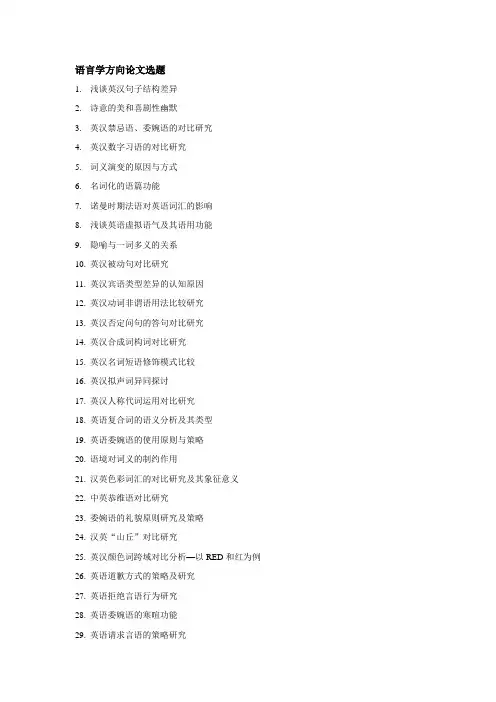
语言学方向论文选题1.浅谈英汉句子结构差异2.诗意的美和喜剧性幽默3.英汉禁忌语、委婉语的对比研究4.英汉数字习语的对比研究5.词义演变的原因与方式6.名词化的语篇功能7.诺曼时期法语对英语词汇的影响8.浅谈英语虚拟语气及其语用功能9.隐喻与一词多义的关系10.英汉被动句对比研究11.英汉宾语类型差异的认知原因12.英汉动词非谓语用法比较研究13.英汉否定问句的答句对比研究14.英汉合成词构词对比研究15.英汉名词短语修饰模式比较16.英汉拟声词异同探讨17.英汉人称代词运用对比研究18.英语复合词的语义分析及其类型19.英语委婉语的使用原则与策略20.语境对词义的制约作用21.汉英色彩词汇的对比研究及其象征意义22.中英恭维语对比研究23.委婉语的礼貌原则研究及策略24.汉英“山丘”对比研究25.英汉颜色词跨域对比分析—以RED和红为例26.英语道歉方式的策略及研究27.英语拒绝言语行为研究28.英语委婉语的寒暄功能29.英语请求言语的策略研究30.英语课堂教师提问的策略研究31.会话得体:会话者的立场语境运用研究32.英语课堂学生提问的策略研究33.英语课堂的焦虑现象及策略研究34.广告口号语的语言特点35.从礼貌原则看短信语言36.从合作原则看课堂师生互动37.浅析中英言语行为中的礼貌原则38.中英政治新闻报道中的模糊语言研究39.言语错误分析理论在教学中的应用40.英汉颜色词的引申义的文化差别41.外语学习中应该重视中介语的作用42.浅谈英汉句子结构差异43.副词EVER的句法环境和语义特征44.论文化差异与英语教学中的文化导入45.学习者的动机因素对外语学习的影响46.浅谈词汇搭配错误分析及其应对策略47.浅析英语语言中的性别歧视现象48.礼貌原则在商务英语写作中的应用49.中英文性别歧视习语的对比研究50.称谓语使用中的性别差异51.从认知角度看隐喻在经济语篇中的应用52.浅析广告语言的特点53.浅谈英语新词的产生、构成及翻译54.浅谈网络英语中的缩略语。
英语系毕业论文选题英语系毕业论文选题是英语专业学生在完成本科或研究生学业前的一项重要学术任务。
它不仅考验学生对英语语言、文学、文化、翻译、语言学等领域的掌握程度,也是对学生独立研究能力和学术写作能力的一次全面检验。
以下是一些可能的选题,供英语系学生参考:1. 英语文学方向- 莎士比亚戏剧中的女性形象分析- 现代主义文学中的都市主题研究- 后殖民文学中的文化身份建构- 英国浪漫主义诗歌与自然的关系- 美国黑人文学中的种族与社会正义2. 英语语言学方向- 英语口语中的语码转换现象研究- 英语词汇习得与记忆策略- 英语语法教学方法的比较分析- 跨文化交际中的语言障碍与解决策略- 英语作为第二语言的语音教学研究3. 翻译学方向- 翻译中的文化差异与适应性策略- 机器翻译与人工翻译的比较研究- 翻译实践中的语义转换问题- 电影字幕翻译中的文化传递- 法律文本翻译的准确性与法律效力4. 英语教育方向- 英语教学中的互动式学习模式- 多媒体技术在英语教学中的应用- 英语作为外语的写作教学策略- 跨文化能力在英语教学中的重要性- 英语教师专业发展与终身学习5. 英语国家文化研究- 美国流行文化对全球文化的影响- 英国社会阶层与文化身份的变迁- 澳大利亚土著文化的保护与传承- 加拿大多元文化政策的实践与挑战- 英语国家节日庆典的文化意义选择毕业论文的题目时,学生应考虑自己的兴趣、研究背景、可获得的资源和指导教师的建议。
一个好的选题应该具有明确的研究目的、清晰的研究问题、可行的研究方法和一定的学术价值。
同时,选题应具有一定的新颖性,能够为学术界或实践领域提供新的见解或解决方案。
88个英语语言学、语言论文题目选题参考1、把握英文演讲中的“演”技2、Study on Non-verbal Language in Communication3、A Talk on Figures of Speech in English Writing4、A study of the causes of Chinglish in writing5、Lexical Features of Advertising English.6、On the Function of Intonation.7、Major Differences between Spoken Discourse and Written Discourse8、广告英语语言特色的分析与研究英汉文化道歉语比较研究9、美国俚语社会语言学研究10、委婉语的社会语言学研究11、从语用角度谈英语委婉语12、报刊英语的语用特色从心理特征看言语委婉的根源13、礼貌的文化内涵和中西会话语用结构对比分析14、论言语模糊及其语用效果15、网络发展中的英语进化Change in English in the Development of Internet16、英式英语和美式英语的差异和将来的发展趋势On British English and America English (differences; the tendency of future development)17、语言学某一领域的研究如词汇研究18、英语习语与历史发展English Idioms and History19、英语习语与文化艺术(English Idioms and Art )20、英汉共同的委婉语手段(The Similarities of Euphemism in Chinese and English)21、英汉广告中修辞格的使用特色The Use of the figures of speech in Chinese and English advertisements22、广告英语的词汇特色研究 A study of the lexical features of advertising English23、双关的妙用On the magic functions of pun24、On the Ambiguity of English Language 论英语语言的歧义现象25、现代英语词汇迅速发展的源泉26、网络英语的词汇类型及其特点27、广告英语的词汇特点28、英语教学中词汇的处理29、英语词汇意义的特点与词汇教学30、论中英文中动物词汇的文化差异31、英汉文化内涵在动物词汇上的体现32、试论篇章词汇衔接的语义基础33、英汉词汇文化内涵探析34、女性相关词汇及其文化内涵35、动物词汇的应用及其隐喻性的探索36、就词汇空缺谈旅游英语翻译技巧37、汉英语姓名文化对比研究38、英语颜色词的词义及文化对比研究39、论提高大学英语词汇教学40、浅析词汇的记忆与词的形态理据之问的关系41、试析英语中的歧义现象42、大学英语词汇教学的有效方法43、英语词汇教学新探44、英语词汇的联想与搭配探析45、英汉词汇比较中文化内涵的展现46、Influence of Chinese Cultural Circumstances on English Learning汉语环境对英语学习的影响47、Social Psychological Factors and Their Influence on ESL社会心理因素和他们对英语学习的影响。
语言学方向论文选题1.浅谈英汉句子结构差异2.诗意的美和喜剧性幽默3.英汉禁忌语、委婉语的对比研究4.英汉数字习语的对比研究5.词义演变的原因与方式6.名词化的语篇功能7.诺曼时期法语对英语词汇的影响8.浅谈英语虚拟语气及其语用功能9.隐喻与一词多义的关系10.英汉被动句对比研究11.英汉宾语类型差异的认知原因12.英汉动词非谓语用法比较研究13.英汉否定问句的答句对比研究14.英汉合成词构词对比研究15.英汉名词短语修饰模式比较16.英汉拟声词异同探讨17.英汉人称代词运用对比研究18.英语复合词的语义分析及其类型19.英语委婉语的使用原则与策略20.语境对词义的制约作用21.汉英色彩词汇的对比研究及其象征意义22.中英恭维语对比研究23.委婉语的礼貌原则研究及策略24.汉英“山丘”对比研究25.英汉颜色词跨域对比分析—以RED和红为例26.英语道歉方式的策略及研究27.英语拒绝言语行为研究28.英语委婉语的寒暄功能29.英语请求言语的策略研究30.英语课堂教师提问的策略研究31.会话得体:会话者的立场语境运用研究32.英语课堂学生提问的策略研究33.英语课堂的焦虑现象及策略研究34.广告口号语的语言特点35.从礼貌原则看短信语言36.从合作原则看课堂师生互动37.浅析中英言语行为中的礼貌原则38.中英政治新闻报道中的模糊语言研究39.言语错误分析理论在教学中的应用40.英汉颜色词的引申义的文化差别41.外语学习中应该重视中介语的作用42.浅谈英汉句子结构差异43.副词EVER的句法环境和语义特征44.论文化差异与英语教学中的文化导入45.学习者的动机因素对外语学习的影响46.浅谈词汇搭配错误分析及其应对策略47.浅析英语语言中的性别歧视现象48.礼貌原则在商务英语写作中的应用49.中英文性别歧视习语的对比研究50.称谓语使用中的性别差异51.从认知角度看隐喻在经济语篇中的应用52.浅析广告语言的特点53.浅谈英语新词的产生、构成及翻译54.浅谈网络英语中的缩略语。
55.论中英文化对隐喻的影响56.礼貌原则在商务谈判中的作用57.浅析英汉语言中的性别歧视现象及其根源58.英诗中的常用修辞研究59.英语词汇中的外来语单词60.国际商务谈判中的语言交际技巧61.对母语在英语写作中词汇负迁移现象的思考62.浅谈英语虚拟语气的语用功能63.新闻标题中的比喻极其功能64.从习语看英汉民族的文化差异65.体育新闻英语文体研究66.论汉英谚语的语言特征67.英汉禁忌语、委婉语的对比研究68.反语的语用功能69.Translation of Guide Words in Tourism English论导游词在旅游英语中的翻译70.Skills and the Translation of Puns in English Advertisement英语广告中双关语的运用技巧及翻译71.Translation and Business-oriented Terms经贸术语及其翻译72.On the Development of English New Words英语新词的发展73.On the Usage of English Abbreviations on the Internet谈网络英语中的缩略语age and Reason of Foreignism in Chinese汉语中外来词的使用现状及原因75.Characteristics of American Slang美国俚语特点初探parison and Contrast between English and Chinese Proverbs77.Differences between American English and British English78.Analysis of Language Features in English News79.A Study of Complimenting80.The Polite Language in the English Language81.An Account of Advertising Language广告用语一瞥82.A Contrastive Analysis of English and Chinese Intonation83.Characteristics and Purpose of English Intonationparison and Contrast of English and Chinese Intonation85.A Comparative Study of English and Chinese Prepositions86.Different Method of learning Phonetics87.On the English Negative Sentences88.交际教学法在英语听说课教学中的适应性89.语篇结构对英语听力理解的影响90.南国商学院英语教师课堂语码转换调查的分析91.英汉口语互动性交际的礼貌规范与失误92.元认知策略对提高英语阅读能力的作用93.奥巴马总统胜选演讲词的特点94.英语报刊灾祸类新闻写作特点例析95.美国之音英语新闻的语篇分析/语言特色96.语篇衔接连贯理论对英语写作的影响97.情感因素对英语学习的影响98.浅析英语夸张修辞99.蔑视女性的词汇和表达法分析100.英语中强调语气的表达方式101.论习语中的象征手法102.认知视觉下体育新闻的批评性话语分析103.科技英语中被动结构的语篇功能104.英汉征婚启事对比研究105.网络聊天室缩略语及其原词语的特点分析106.浅谈二语习得中的社会因素Thesis on the Social Factors and Second Language Acquisition 107.论英语语言教学中的文化教学On Culture Teaching in English Language Teaching108.中英文常用修辞格对比研究 A Contrastive Study between Frequently Used Figures of Speech in English and Chinese109.浅析英语委婉语的语用功能A Study of Pragmatic Functions of English Euphemisms 110.浅谈广告英语中的修辞A study of Rhetorical Features of English Advertisements111.浅谈英语影视作品中的英语词汇和习语Practical Application of V ocabulary and Idioms in English Films and Televisions112.英汉复合词的对比分析Contrast between English Compounds and Chinese Compounds 113.英语商业广告的词法特点分析An Analysis of Morphological Features of English Commercial Advertisements114.英语习语在日常生活中的运用Application of English Idioms in Daily Life115.场依赖性和场独立性对英语学习者听力的影响The Effect of Field Dependence and FieldIndependence on English Learners’ Listening Ability116.论英汉翻译中汉语方言的正迁移Positive Transfer of Chinese Dialect on English-Chinese Translation117.中式英文在中国流行的分析An Analysis of the Popularity of Chinglish in China118.英语中的性别差异及性别歧视Sexual Differentiation and Sexism in the English Language 119.论第二语言学习的态度及动机On Attitudes and Motivation in Second Language Learning 120.试论因特网在第二语言习得中的辅助作用The Assisting Function of the Internet in Second Language Acquisition121.英语缩略语在汉语语境中的功能分析Functional analysis of English acronyms in Chinese context122.汉语新闻报道中英语缩略语的语用优势Pragmatic advantages of English acronyms in Chinese reports123.非语言因素在第二语言习得中的作用The Function of non-linguistic factors in Second Language Acquisition124.汉语方言口音对英语发音的影响Influences of Chinese Dialectic Accents on English Pronunciation125.英语动物隐喻研究A Study on Animal Metaphors in English126.英语体育新闻语篇文体特征浅析Stylistic Features of Sports News English127.英语与汉语中暗喻的对比Contrast between English Metaphor and Chinese Metaphor 128.英汉语言禁忌对比研究A Contrastive Study of Verbal Taboo in Chinese and English 129.英汉拒绝语的对比研究 A Contrastive Study of English and Chinese Expressions in Refusing or Declining130.语言模糊现象在语言交际中的运用An Analysis of the Application of Fuzzy Language in Communication131.On Politeness Norms and Mistakes in Interactive Communication of Spoken English英汉口语中互动性交际的礼貌规范与失误132.Pragmatic Analysis on the Approximating Quantities with Numbers数词模糊语的语用分析133.刻意曲解(Deliberate Misinterpretation)的语用动机和功能134. A Study of the Elements in Improving English Listening Ability under Computer- and- Internet- Assisted Circumstance计算机网络下的英语听力能力提高的元素135.A Cognitive Semantic Analysis of Color Terms in English and Chinese英汉颜色词的认知语义分析136. A Study of Symbolic Meanings of English and Chinese Numeral Words英汉数字词的象征意义研究137.英汉歧义句对比研究A Comparative Study of Ambiguous Sentences in English and Chinese138.英汉幽默语用研究A Comparative Study of Humor in English and Chinese139.英语专业学生作文选词策略A Study of Diction-Choosing Strategies in English Majors’ Compositions140.网络聊天室缩略语及其原词语的特点分析An Analysis of the Characteristics of Abbreviations and Their Original Words in Online Chatroom141.The Phenomenon of Mother Tongue Transfer in English Writing英语写作中的母语迁移现象142. A survey of the Use of Reading Strategies by College Students大学生英语阅读策略运用的调查及分析143.A Survey of the Use of Writing Strategies by College Students大学生英语写作策略运用的调查及分析144.A Comparison between English and Chinese Analogic Rhetoric英汉比喻修饰格的对比145.Pragmatic Failures in the Cross-cultural Communication 跨文化交际中的语用失误146.Cross-culture Failures by Chinese Learners of English中国英语学习者跨文化交际中的误区147.Error Analysis in Learning English as a Foreign Language 英语学习中的错误分析研究148.Symbolism in Idiomatic Expressions 论习语中的象征手法149.英语语言在男女性别中的差异Language Differences between Males and Females –An Analysis of English Language Features From the Perspective of Gender150.中英思维差异对英语学习的影响The Effects of Differences in Thinking between Chinese and English on English Learning151.中英思维差异对英语写作的影响及其应对策略The Effects of Thinking Differences between Chinese and English on EFL Writing and the Solutions152.文化差异对初学者习得英语句法的影响The Effects of Culture Differ ences on Beginners’EFL Syntactical Study153.电子语料库对英语学习的革命Electronic Corpus – An Evolution of EFL Learning154.英语词汇记忆方法归纳On How to Memorize English Vocabulary155.法语对英语词汇的影响Influence of French upon English Vocabulary156.对中式英语产生的成因的初步研究和对策A Tentative Study of the Causes of Chinglish and Solutions157.语音形状在语篇中的作用Phonology in English Discourse158.Culture Features in American Slang美国俚语中的文化特点159.通过女权主义分析一部英文著作(例如《秃头歌女》)Analysis of an English novel from the perspective of feminism (for example, The Bald Soprano)160.通过东方主义分析一部英文著作(例如《黑暗的心》)Analysis of an English novel from the perspective of Orientalism (for example, Heart of Darkness)dy Gaga的流行看当今年轻人的反叛元素The prevailing Lady Gaga phenomenon – the rebelling spirit of today’s younger generation162.从《美国达人》到全球热播的选秀节目看美国文化的影响力From America's Got Talent to the worldwide-flourishing talent shows – the influence of American culture163.从英语谚语看圣经的文化影响力The Cultural Influence of the Bible on English Proverbs 164.英语中的汉语词汇——论汉语对英语的反哺作用Chinese V ocabulary in the English language –back feeding of Chinese to English165.A Tentative Study of English Proverbs166.Negation in the English Language167.A Study of English Euphemism168.A Comparison between English and Chinese Politeness Principles169.Noun-verb Conversion in Contemporary English170.Politeness and Indirect Speech Acts171.On Intercultural Nonverbal Communication172.The Effect of Context in the Meaning of Words173.Influence of Science and Technology on English V ocabulary 174.A Study of English Word-Formation Rules175.Ambiguity and Puns in English176.On New Coinage in Contemporary English。